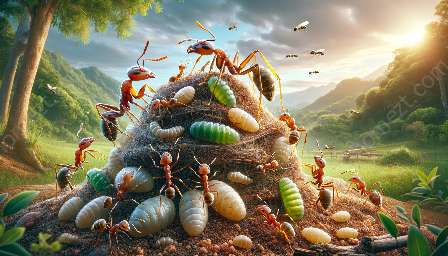Integrated pest management (IPM) is a comprehensive approach to pest control that emphasizes ecological and sustainable methods. When it comes to ants, a particularly common pest in both residential and commercial settings, understanding their behavior and employing effective control strategies is crucial.
Understanding Ant Behavior and Biology
Ants are social insects that live in colonies, with each colony containing thousands of individual ants. They are highly organized and work cooperatively to forage for food, build nests, and care for their young. Ants are attracted to sugary and greasy substances, making them a common nuisance in homes, restaurants, and food storage facilities. Understanding their behavior and biology is essential for developing an effective pest management plan.
Components of Integrated Pest Management for Ants
Integrated pest management for ants involves a combination of preventive measures, monitoring, and control strategies. The following components are integral to an effective IPM approach for ant control:
- Identification: Proper identification of the ant species infesting a property is essential for selecting the most appropriate control methods. Different ant species may require different treatment strategies.
- Sanitation: Maintaining clean and hygienic conditions can help reduce ant access to food and water sources, making the environment less hospitable for them.
- Exclusion: Sealing entry points and cracks that ants use to gain access to buildings can help prevent infestations.
- Baiting: The use of ant baits that contain slow-acting insecticides can effectively control ant populations by targeting the entire colony.
- Biological Control: Introducing natural ant predators or utilizing biological agents can help keep ant populations in check without the use of harmful chemicals.
- Cultural Controls: Modifying landscaping practices and reducing attractive harborage sites can deter ants from establishing colonies in outdoor areas.
- Mechanical Controls: Physical methods such as vacuuming, trapping, or removing ant nests can provide immediate relief from infestations.
Advantages of Integrated Pest Management for Ants
IPM offers several advantages when it comes to managing ant infestations. By focusing on long-term prevention and utilizing multiple control strategies, IPM minimizes the reliance on conventional pesticides and reduces the potential for environmental harm. Additionally, IPM promotes the use of eco-friendly and sustainable solutions, making it a preferred approach for environmentally conscious individuals and businesses.
Embracing Eco-Friendly and Sustainable Solutions
As concern over the environmental impact of traditional pest control methods continues to grow, integrating eco-friendly and sustainable solutions for ant management becomes increasingly important. IPM aligns with these concerns by prioritizing non-toxic and low-impact control measures that safeguard the health of ecosystems and non-target organisms.
Implementing Integrated Pest Management for Long-Term Ant Control
Successfully implementing an integrated pest management plan for ants requires ongoing monitoring and proactive measures. By continually assessing the effectiveness of control strategies and making adjustments as needed, property owners can maintain a pest-free environment while minimizing the risks associated with traditional pest control methods.
Integrated pest management for ants represents a holistic and responsible approach to pest control that addresses the unique challenges posed by ant infestations. By understanding ant behavior, adopting preventative measures, and embracing eco-friendly solutions, individuals and businesses can effectively manage ant populations while promoting environmental sustainability.





















